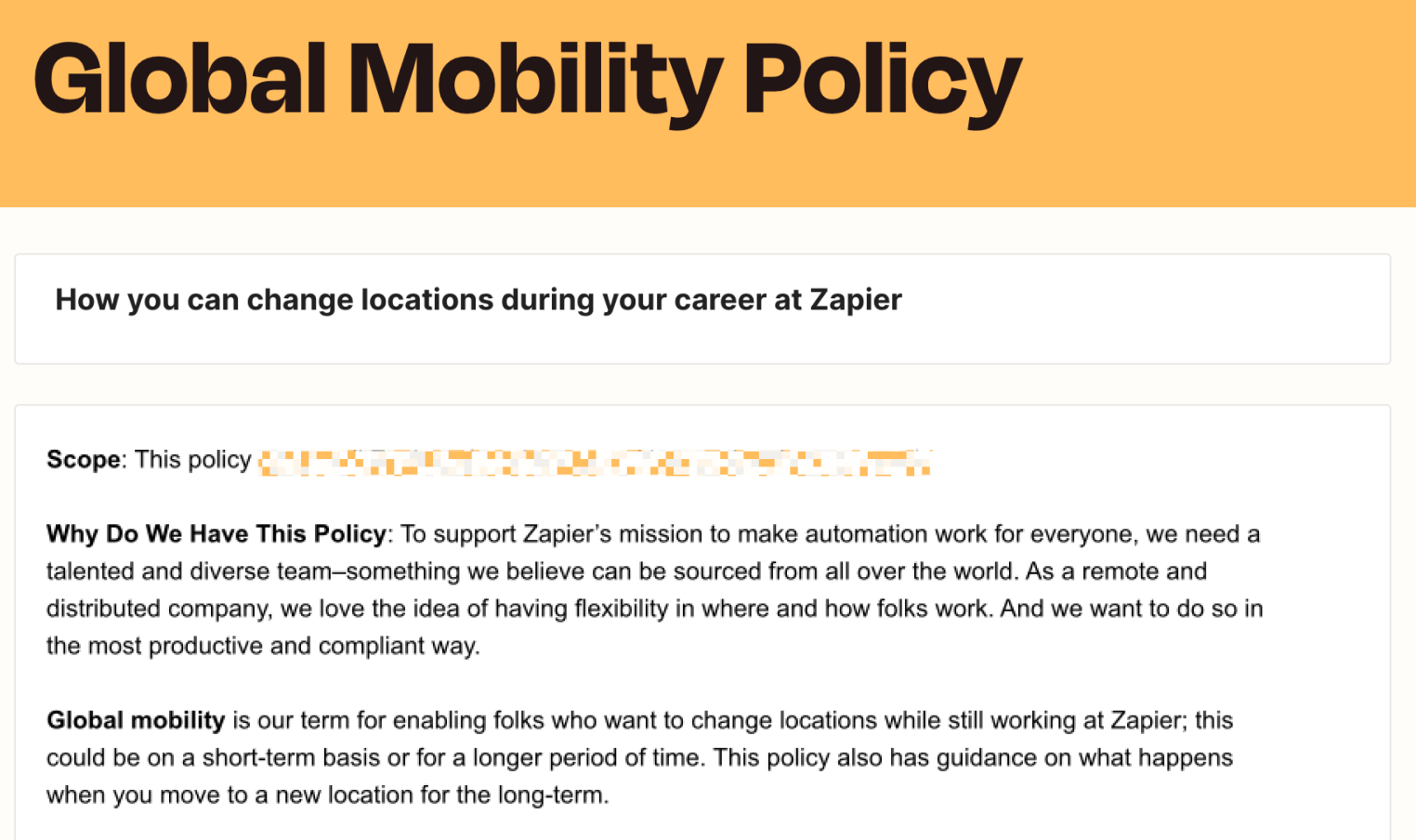At Zapier, we've been working remotely since day one. As an OG fully remote and globally distributed company, we love offering flexibility around where, when, and how our teammates work. Today, we have over 800 team members logging in across 40 countries in all types of work arrangements: city dwellers, country folks, van lifers, country-hoppers, digital nomads, and everything in between. So, it felt natural to create a policy to support global mobility, on both a short- and long-term basis, to enable those who want to move around while still working at Zapier.
Why create a global mobility policy?
If Zapier was already remote and distributed, why create a global mobility policy?
Well, as more companies have adopted remote or hybrid work arrangements post-pandemic, it's become clear that being remote doesn't always translate to workplace flexibility. The reality is that constraints like time zones and lacking a (truly) remote-friendly work environment still tie most remote and hybrid work arrangements to specific locations—and can sometimes feel even more inflexible than being in the office.
By formalizing a global mobility policy, we push remote work at Zapier to be more than just work from home, and we normalize having folks decide where and when they work. The policy doesn't promise to sponsor visas or pay for relocation, and there are still restrictions in some countries that we can't get around. But by creating a policy for mobility, we make it clear that this is an option for all Zapiens, and we give team members the information they need to move around comfortably while still meeting expectations for their roles.

It's about more than the policy
Even a formalized global mobility policy still isn't sufficient to guarantee workplace flexibility. There need to be cultural norms that facilitate these moves and ensure that they don't cause undue stress on the team member, the team, or the company. Here are a few things we've learned over the past decade or so about supporting a global and mobile workforce:
Set clear guidelines around mobility
Our policy categorizes global mobility into three distinct categories: traveler, digital nomad, and long-term moves. Each category has a well-defined list of recommendations, norms, and procedures attached to planning and executing those moves. By making this a company-wide policy, guidelines are clear to everyone involved, and we ensure this opportunity is equally accessible to anyone who meets the criteria.
Create strong hiring practices
We rely heavily on our hiring practices to ensure we bring the right people onto our team. Our trust in our hiring process means that we trust our teammates to do their job well from day one, regardless of their location. Part of creating strong hiring practices in a flexible workplace is prioritizing skills that are necessary for remote and global environments. For us, this includes skills like strong written communication, self-motivation, and adaptability.
Set clear goals
Clear and attainable goals are pivotal to the success of these types of policies because they act as clear checkpoints for individual contributors and managers to ensure global mobility doesn't get in the way of work performance. For us, these goals adhere to our Career Growth Frameworks that are written for each role and level at the company.
Embrace asynchronous communication and work
Remote work that keeps people stuck in meetings or seems to require 24/7 availability is equally as inflexible as most in-office arrangements. By embracing asynchronous work, we normalize different time zones, schedule fewer meetings, and welcome the changes needed to accommodate a global workforce.
Encourage formal flexibility
We encourage Zapier teammates to formally claim the space and time they need to create the work environment they're comfortable with, not just as one-off allowances but as a regular, standard practice. This way, flexibility is understood as the norm, and working in a different time zone won't feel like a disturbance to your team's usual workflow. We do this in a few ways:
We create company-wide policies (like our global mobility policy) so that everyone is on the same page.
We have company-wide calendar best practices to keep our calendars up to date and our team informed of our typical working hours.
We link Slack to our calendars, so folks don't have to go far to know if someone is taking time off, having lunch, or picking up their kids from school.
A formal policy isn't enough to ensure the flexibility we're striving for, but our hope is that, through these policies and the norms we create around remote and distributed work, Zapier teammates from all over the world can prioritize their personal life without it coming at the expense of their professional achievements.







